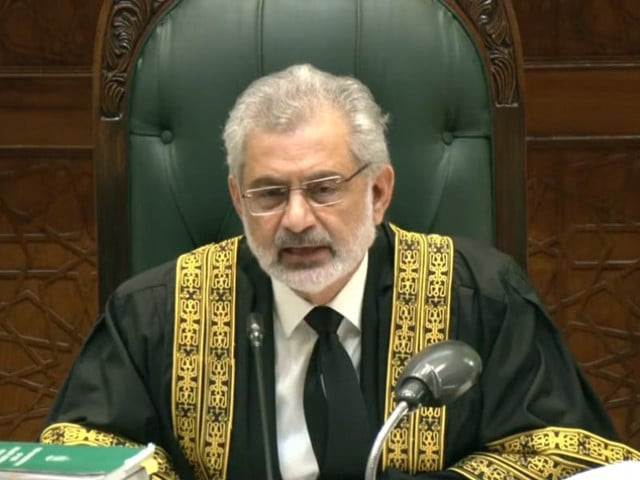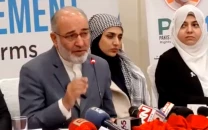Dissenting note: reserved seats ruling not binding
CJP Isa, Justice Mandokhel state majority judgment lost sight of the basics

Chief Justice Qazi Faiz Isa and Justice Jamal Khan Mandokhail on Tuesday issued their dissenting notes in the reserved seats case, saying that the majority decision lost sight of the basics, and that judges should decide cases in accordance with the Constitution and law, based on the material available before them.
Chief Justice Isa further stated in his dissenting note that review appeals against the majority judgment in the reserved seats case had not been finally decided, therefore, the case had not been decided, so its implementation was not "binding".
Justice Mandokhail said that the Election Commission of Pakistan (ECP) and the returning officers (ROs) in the 2024 elections, wrongfully declared 39 Pakistan Tehreek-e-Insaf (PTI) lawmakers as independents, adding there was nothing on record to prove that the remaining 41 members were from the party.
After the February elections, the PTI-backed independents joined the Sunni Ittehad Council (SIC). However, the ECP denied the SIC the proportional quota of the reserved seats for women and minorities. The SIC challenged decision in PHC and lost and then moved the apex court.
In May, the Supreme Court constituted full court to hear the case. Led by Chief Justice Isa, the full court comprised justices Mansoor Ali Shah, Munib Akhtar, Yahya Afridi, Aminuddin Khan, Jamal Khan Mandokhail, Muhammad Ali Mazhar, Ayesha Malik, Athar Minallah, Syed Hasan Azhar Rizvi, Shahid Waheed, Irfan Saadat Khan and Naeem Akhtar Afghan.
On July, 12, with an 8-5 verdict the full court set aside the March 25 PHC judgment and March 1 ECP decision to deny reserved seats to SIC as ultra vires of the Constitution, and ruled in favour of awarding the reserved seats to PTI.
Chief Justice Qazi Faez Isa read out the minority judgement, written by Justice Mandokhail, saying that those who joined the SIC were presumed to have done so out of their own free will and none of them claimed to have joined the party because of any misunderstanding of any judgement.
"I agreed with the short order dated 12 July 2024 authored by Justice Jamal Khan Mandokhail and agree with his detailed reasons thereof which have been issued today," Chief Justice Isa said in his 14-page dissenting note on Tuesday.
The note said that the majority's short order was announced on 12 July 2024, after which the judges had to issue their detailed reasons, but instead, a purported "order" was uploaded on the Supreme Court's website on September 14, 2024 without informing the chief justice and the other Judges.
"I consider it my duty to point out the constitutional violations and illegalities in the majority's short order of 12 July 2024, and the majority's detailed judgment of 23 September 2024, the order/ clarification of 14 September 2024 and the Clarification of 18 October 2024, respectively." he added.
According to the chief justice, the review petitions against the majority short order could not be heard because Justice Mansoor Ali Shah and Justice Munib Akhtar outvoted him on the committee which scheduled the case for hearing.
"The majority set up its own virtual court, permitted the making of 'an appropriate application' by the ECP and PTI, and directed that such appropriate application would only be heard by them whilst cloistered in Chambers," he added.
In doing this, according to the chief justice, the majority of the judges effectively legislated, because neither the Constitution nor any law permitted what they did. "Incidentally no party or counsel during the hearing ever suggested the course of action which the majority adopted," he continued.
He said that in effectively legislating, the judges in the majority also contradicted themselves: they stated that the ECP and the PTI might "apply to the court" but then proceeded to state that only the "judges constituting the majority" would hear the "appropriate application".
"The majority disregarded the precedents of this Court, including the above. They not only carved out a separate eight-member 'court' from the thirteen-member Court, but also innovated further by not finally concluding the hearing of the appeals, because they permitted appropriate application to be filed, introduced timelines and changed what the Constitution provided."
The chief justice concluded his note, saying: "The applicable provisions of our Constitution are clear and self evident, and it is best not to look for meaning which does not exist in the Constitution of the Islamic Republic of Pakistan."
Justice Mandokhel said in a 17-page note that ROs and the ECP wrongfully declared the 39 PTI candidates as independent. As far as the remaining 41 independent members were concerned, there was nothing on record that they were from PTI.
"The declarations in the nomination papers of 41 candidates were stated as independents, which were also accepted by this Court unanimously. It is for this reason, the Hon'ble majority Members gave the 41 independent candidates an option that they may join PTI within a period of fifteen days," he said.
"We do not agree with the decision of majority members with regard to providing opportunity to 41 independently returned candidates, who have already joined SIC, by exercising their constitutional right. They are now members of SIC," he added.
"Neither the Constitution nor the [Election] Act permits us to issue direction or provide an opportunity or additional avenue to them to join another political party and that too, within a period of fifteen days," Justice Mandokhail noted.
Since, the appellant "does not qualify for reserved seats", Justice Mandokhail said in his dissenting note, "Therefore, we cannot mould the Constitution in a manner to facilitate SIC." He also said that the reserved seats could not be left vacant.



















COMMENTS (1)
Comments are moderated and generally will be posted if they are on-topic and not abusive.
For more information, please see our Comments FAQ